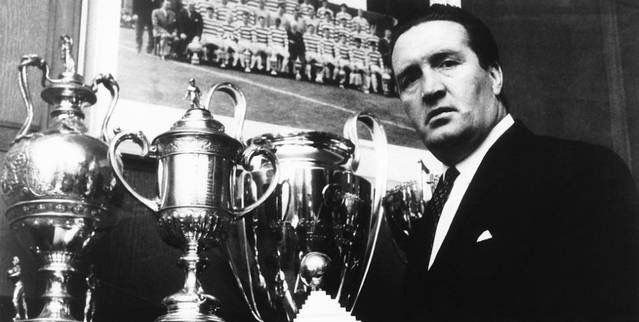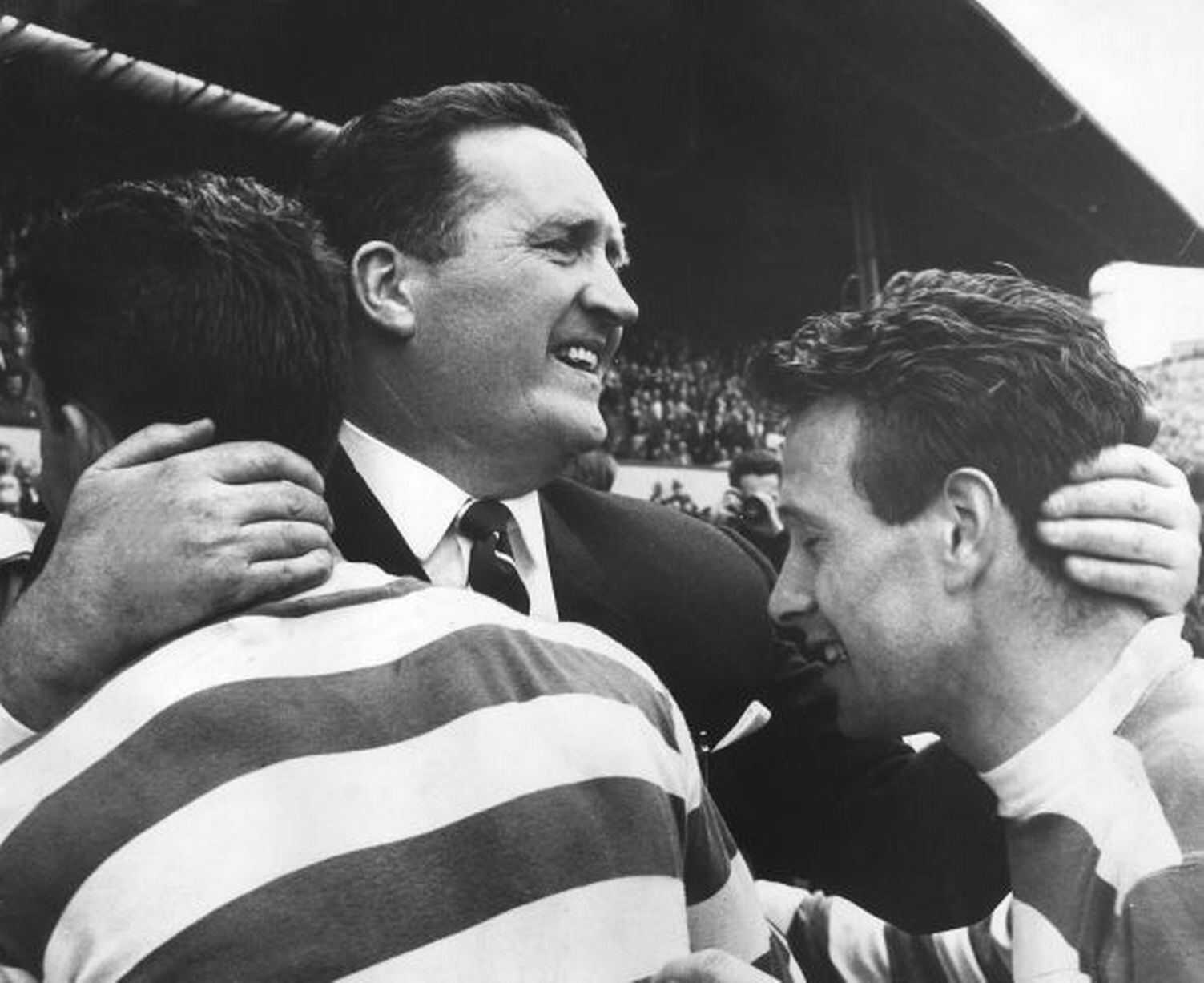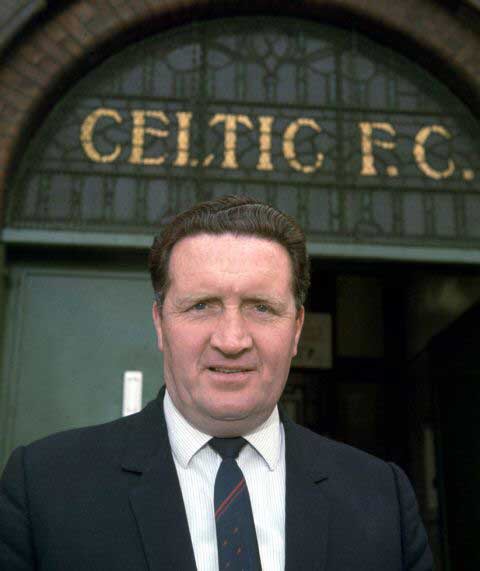Jock Stein was only too aware of the date as the Celtic coach transported his players from Seamill to Hampden for the Scottish Cup semi-final against Clyde on April 1, traditionally known, of course, as ‘April Fool’s Day’. It was a potential banana skin against part-time opponents who went into the encounter as 5/1 rank outsiders.
Davie White, the bold and aspiring thirty-three-year-old Clyde manager, was earning deserved acclaim for what he was achieving at the prudent Shawfield outfit. He made no brash or outrageous boasts before the match and merely announced he hoped his team would do enough to make their supporters proud.
He wasn’t quite in the same class as Stein in the kidology stakes, but he had a fair stab at it, anyway. White, who spent his entire nine-year playing career at the homely Rutherglen club, was asked if he had anything special lined up for his team as they prepared for the big game. Producing the underdog card, he replied, ‘Well, if I could get all the players off their work at the same time that would be great.’
Stein, the master in the dark art of deception, might even have smiled at the bluff by the ambitious young pretender. The shrewd Celtic manager would have been well primed about the form of Clyde during their 1-0 league win over Dunfermline at Shawfield the previous month. He wouldn’t have forgotten their 5-1 trouncing of a fine Hibs team in November. Nor would he have overlooked a 1-0 victory over full-time Morton at tricky Cappielow in an earlier round of the Scottish Cup.
There was more than just a ‘let’s-forget-about-the-ball-and-get-on-with-the-game’ approach from his last-four opponents. One newspaper scribe had watched in obvious awe at White’s assembled bunch of butchers, bakers and candlestick-makers and wrote, ‘Clyde move the ball out of defence into attack with the grace and accuracy of a conjurer opening his scarves to reveal a dove.’ Nobody’s fools, then.
Jock Stein wasn’t buying into the notion that the game was already a foregone conclusion. Emphasising that outlook was the fact the Celtic medical staff had worked all week in an effort to have Bobby Murdoch one hundred per cent fit to play after missing the Partick Thistle game with the ankle injury sustained the previous Saturday against Hearts.
The broad-shouldered midfielder with the svelte touch underwent two x-rays before Stein reluctantly ruled him out and once again played Willie Wallace in the right-hand side of his midfield twosome. On this occasion, he would be partnered by Bertie Auld with Charlie Gallagher dropping onto the substitute’s bench.
Drizzle greeted Billy McNeill and Harry Glasgow, the respective captains, as they led their teams out of the tunnel, across the red ash running track and onto the drenched pitch. The infuriating Hampden Swirl was once more making its annoying presence known.
This was to be Celtic’s seventeenth domestic Cup-tie of the season, including the League and Glasgow Cups, and Stein’s team had won the lot. Clyde, with combination of true grit, exceptional organsation and generous fortune, were ninety minutes away from ending the sequence. The encounter finished all-square without either keeper being invited to retrieve the ball from his net.
And, yet, Celtic claimed with validity for a penalty-kick four minutes from time; the proverbial stonewaller that was witnessed by everyone in the 56,704 crowd with the curious exception of the only man who mattered, referee John Gordon.
The match official was no stranger to controversy and, in 1978, was banned by the Scottish Football Association after receiving gifts to the value of £1,000 from AC Milan before a UEFA Cup second leg tie which the Italians won 3-0 against Levski Sofia following a 1-1 draw in Bulgaria. The suspension was just twelve years too late for the frustrated Celtic contingent congregated around the vicinity of Mount Florida that afternoon.
Photographs in the following day’s newspapers showed incontrovertible proof that Clyde defender Davie Soutar had used an elbow to divert a goalscoring shot from Jimmy Johnstone off the line. Remarkably, Gordon waved play on to utter disbelief of the Celtic players and obvious relief of their Clyde counterparts.
It would be trite to imply the part-timers did not deserve something following their superhuman efforts, but it is difficult to ignore the fact that luck intervened on sporadic occasions to keep them interested in the national competition. Billy McNeill twice powered headers beyond Tommy McCulloch and resolute defender Glasgow cleared the first and, moments later, John McHugh performed another last-ditch rescue from under the crossbar.
One watching scribe observed, ‘To be truthful, it was a dour battle, fought without marked inspiration by either side. The general standard of passing and finishing was deplorably low and, although there was perhaps more excitement in the second-half during which Clyde were facing into a troublesome wind, it was fleeting and, as often than not, completely unproductive. It is perhaps indicative of the afternoon’s trend of events that all the players who passed muster were in defence. Billy McNeill, as well as being a masterful centre-half, was the game’s most effective attacker, even if he did confine his efforts in that sphere to corner-kicks.’
The reporter continued, ‘Such was the ineffectiveness of the forwards that it was not until thirty-one minutes had elapsed that either goalkeeper had to make a save of any consequence and, even then, it was by a defender, Tommy Gemmell, who brought out the best in Tommy McCulloch with a tremendous shot from twenty yards which looked netbound all the way until the goalkeeper miraculously turned the ball over the crossbar one-handed.’
Jock Stein left immediately after the game to catch a plane bound for Czechoslovakia to watch European Cup semi-final opponents Dukla Prague. He admitted, ‘Yes, it’s disappointing not to finish the game and we had the chances that would have gone in on another day. An extra fixture at this stage of the season is something we could do without, but we are still in the tournament and we will just have to win the replay.’
The second game would have to be played again on the following Wednesday which would give the Celtic manager, scheduled to return from the Czechoslovakian capital on Monday, forty-eight hours to prepare his players for another Hampden tilt. His mood was heightened somewhat when he was informed Rangers had lost 1-0 to Dunfermline at Ibrox and Celtic were now two points ahead at the top of the table with a game in hand and only five matches left to play. The Parkhead side were now massive favourites to achieve their second successive championship.
In front of a crowd of 55,138 in the replay, Celtic were two goals ahead by the twenty-second minute, courtesy of efforts from Bobby Lennox and Bertie Auld, and had as good as booked their third successive Scottish Cup Final berth during Jock Stein’s reign and their fifth in seven years. Willie Wallace again lined up in the No.4 shorts, but, on this occasion, was hardly a direct replacement for Bobby Murdoch. Stein gave that position to Charlie Gallagher with Auld playing beside him on the left. By the time Davie White had cottoned on, his team were heading for the exit.
The opening goal arrived as early as the second minute when Stevie Chalmers had a shot blocked and Lennox swooped on the rebound. And Auld, displaying his usual quick thinking, claimed the second after Chalmers had nodded the ball into his path. The midfielder flummoxed his marker Stan Anderson with a swift shuffle of his feet and a change of direction before belting an effort high past Tommy McCulloch.
From THAT SEASON IN PARADISE – TEN MONTHS OF CELTIC HEAVEN by Alex Gordon out now on CQN Books and available at www.cqnbookstore.com and at Celtic stores.




